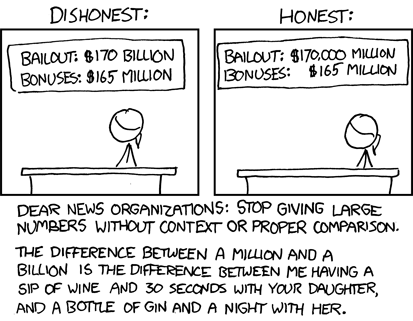An observation regarding suspension of disbelief, from the source of all
knowledge
Some find it strange that while some audience members took issue with the flimsiness of Superman's disguise, they didn't take issue with the idea of the existence of a superbeing whose only weakness was kryptonite. One arguing from the theory of suspension of disbelief would contend that while Superman's abilities and vulnerabilities are the foundational premises the audience accepted as their part of the initial deal; they did not accept a persistent inability for otherwise normal characters to recognize a close colleague solely because of changes in clothing.
Gary Larson discussed the question with regard to his comic strip, The Far Side; he noted that readers wrote him to complain that a male mosquito referred to his "job" sucking blood when it is in fact the females that drain blood, but that the same readers accepted that the mosquitoes (in "fact") live in houses, wear clothes, and speak English.
We sort of tell the author/producer, "We'll allow you to break these rules, but everything else must be realistic." So science fiction writers are allowed to postulate the existence of faster-than-light travel, but not witches, for example. As I wrote
earlier, when the author surprises you and tells you you need to suspend more disbelief, it pulls you out of the story and lessens your engagement. Also, a mid-story request for more suspension of disbelief is poor storytelling
technique.
This is why I liked
Inception. (I watched it one and a half times on the flight to California.) If you haven't watched
Inception, then I fear you won't get the rest of this post. Oh well.
Your loss. The loss is mutual.
From the first (real) scene (after the introductory stuff which you cannot understand the first time watching the movie) you know exactly how this movie world is different from the real world: people are able to climb into other people's dreams and fool around. Everything else in the movie makes perfect sense once you accept that premise. If extraction were possible, dreams within dreams would also be possible, the "kick" would work the way it does, the strange aberrations of the laws of physics when the van bounces would be unavoidable, the projections would act the way they do, and all that. It's really a well-thought-out movie.
But wait! Not only is
Inception as good as realistic fiction, it's better! In fiction, there's this idea that if you really, really want something, the universe conspires to make it happen. For example, if a snowstorm keeps your mother-in-law from getting the birthday card you mailed her, the literary critics will blame it on your dislike of your mother-in-law. Or if you really are "misyached" with the person who locked a safe, you'll be able to correctly guess the code. That's non-realistic and stretches my suspension of disbelief. But in
Inception it's totally legitimate that Cobbs' issues with his wife mess up his work and that they expect Fisher to remember a code that's never been told to him. They're in the dream world, so of course the "universe" brings about whatever the subject's and the dreamer's subconscious wants.
So I was able to get really involved in
Inception. When they get on the plane, my heart was pounding. When they landed on the first level (in the pouring rain) I almost died from nervousness. And when Cobbs finally sees his kids, my eyes were wet. It was just so right.
On a side note, I'd be very appreciative if anybody could shed light on Arthur's role. Is he really just a dumbass like Eames (the forger dude) makes him out to be, or is there some sechel behind his sharp suits and formal, know-it-all talk?





